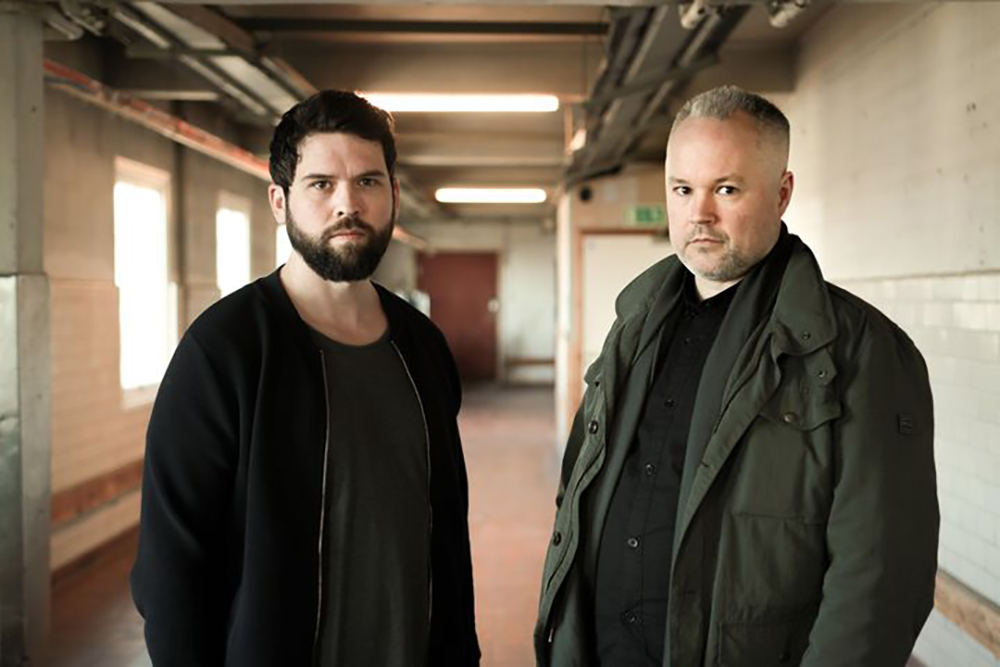Films that wrap up neatly end at the theatre; ones that ask questions instead of providing answers begin when the credits roll. Well, at least that’s what Iranian filmmaker Asghar Farhadi believes, and so do Michael Støen and Ariel McMillion, the brother team behind the award-winning short film “The Intimate Touch.”
At The Movie Buff, we recently had the chance to watch the duo’s film, and were impressed with not just the production level of the short indie film (the production takes place within 19 minutes), but the picture and the conversation it brings to the table. “The Intimate Touch” is about attraction, ideology, and what happens when the two collide. The film’s leads (Isa Aouifia, Anna Harling) have a mutual connection. Harling’s Ingrid is a journalist and Isa’s Adnan is a source for an article. However, Ingrid is a staunch feminist and Adnan is a devout Muslim.
You can see how this sets up a tough topic to tackle; but Støen and McMillion handle the material deftly, thoughtfully, and with care.
Mark Ziobro of The Movie Buff recently had the chance to talk to the filmmakers, getting their thoughts on “The Intimate Touch,” its overarching message, and the trials and tribulations of being an independent filmmaker in today’s world.
Mark Ziobro for The Movie Buff: Thank you to both of you for talking to us. Can you introduce yourselves for our readers?
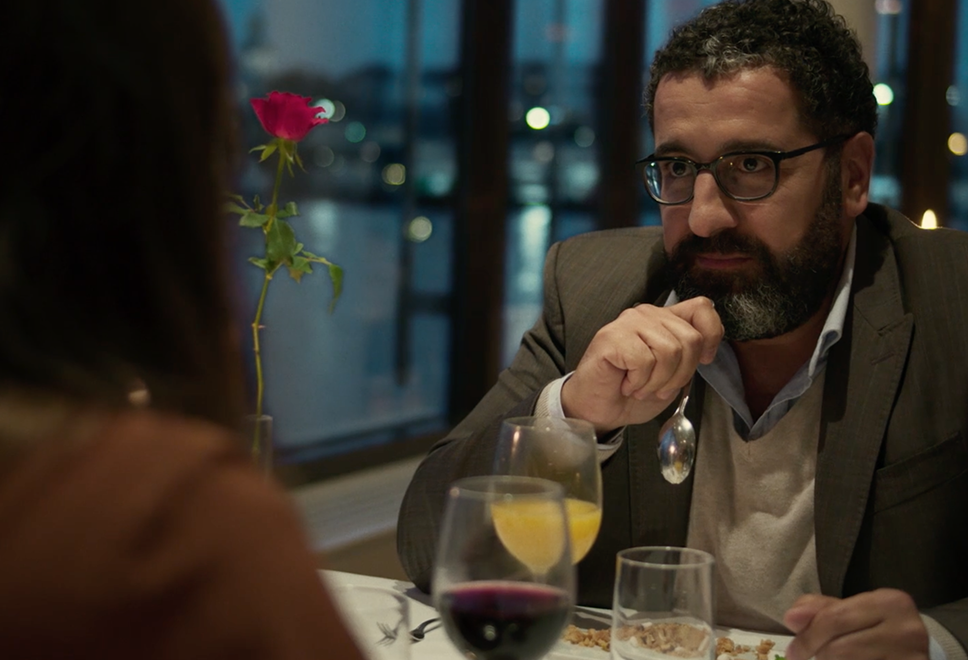
Michael: Thank you for your interest in our film! First thing to say, probably, is that the two of us are brothers—something not obvious by our different last names. We’re both creatives of sorts, based out of Gothenburg, Sweden.
Ariel: Yeah, “creatives” is nice and general. Sometimes there’s “advertising” in front of it—at least in my case. I think both of us are drawn creatively in more than one direction, but film is where we come together.
Have you two been working together long? Is “The Intimate Touch” your first project together.
Michael: We’ve both always been interested in film, but I started out pursuing a music career while Ariel, who is ten years my senior, was still working as an illustrator. At the same time though I was working on a B.A. in Cinema Studies at the University of Gothenburg, which led me to some office work at a film production company in Stockholm. That inspired me to really start trying my hand at the craft.
After moving back to Gothenburg and getting a little local grant for my first project I asked Ariel if he could help me out as a production designer which he was happy to do and we started collaborating from there. He co-wrote some stuff with me and also co-directed a thing I wrote. For “The Intimate Touch” though, which we conceptualized together, we decided to work as equals from start to finish. So this is the first film that the both of us have written and directed.
Have either of you made any movies on your own? If so, can you tell us about some of them?
Michael: Yeah, sure. I studied media production in high-school and had dabbled in filmmaking quite a bit by the time I went to university but, like I said, I was really pursuing music at the time. My first serious film, the one for which Ariel was production designer, was a short called “Mamma Therese” which dealt with the idea of altruism as an addiction. I had heard a psychologist define addiction as not primarily about substance abuse but any situation where you end up prioritizing one desire to the detriment of all others desires. If you consistently want to go shopping, say, more than you want to have good relationships, or pay your rent, brush your teeth, et cetera, then you’re an addict.

When I heard that I thought: what if that irrationally prioritized desire were for something we normally think of as positive, like altruism? Would that also constitute an addiction? I didn’t know what to make of that, which really sparked my interest. So I made a short film about a woman who prioritized her desire to help others over all other desires in her life, including the desire to have a healthy relationship with her teenage son, through whom the story was told.
Since then I’ve made a few more shorts which I never really released but were more like exercises to develop and gain experience. And in between I’ve been freelancing on and off, doing some commercial film work; but lately I prefer to get my paychecks entirely from my day job so I can channel all my film-mojo into my own passion projects.
Ariel: Well, I consider “The Intimate Touch” my debut as a dramatic filmmaker. The other film work I do currently is mostly in advertising. Hopefully I can change that.
Can you tell us about what prompted you to make this movie? What were your writing inspirations?
Michael: Yeah, we got the idea right after releasing “Mamma Therese,” actually, but for various reasons we kept putting it on hold; and when we finally did start working on it the writing process was extremely slow. Considering the sensitive topics we were getting into, every sentence was deliberated over for hours on end. So it’s been years now since we first got the idea.
There was a media debate going on in Sweden at the time, I think it was 2013, about a feminist woman who had fired her Muslim intern because he refused to shake her hand. She felt he was being sexist. He felt she was discriminating against his religious beliefs. We didn’t know what to make of it really and, just like with “Mamma Therese,” that sparked our interest.
What Ingrid and Adnan both want, ultimately, is to believe that a romantic life with the other person is possible. But “possible” means something different for each of them.”ariel mcmillion
Both of us have a hard time with films that want to preach a message; they usually fall flat artistically despite good intentions. Our favorite films have been the ones that explore difficult topics honestly and deeply, asking questions rather than giving answers. We thought: what would happen if these two people were the same age and intensely attracted to each other, forcing them to face their differences in conversation? That idea was interesting to us because we saw how there would be a conflict between their basic human emotions and their culturally accrued ideas and world-views—something which we had experienced a lot growing up in a very religious family.
What do you think is going through Ingrid’s head during this film? How about Adnan?
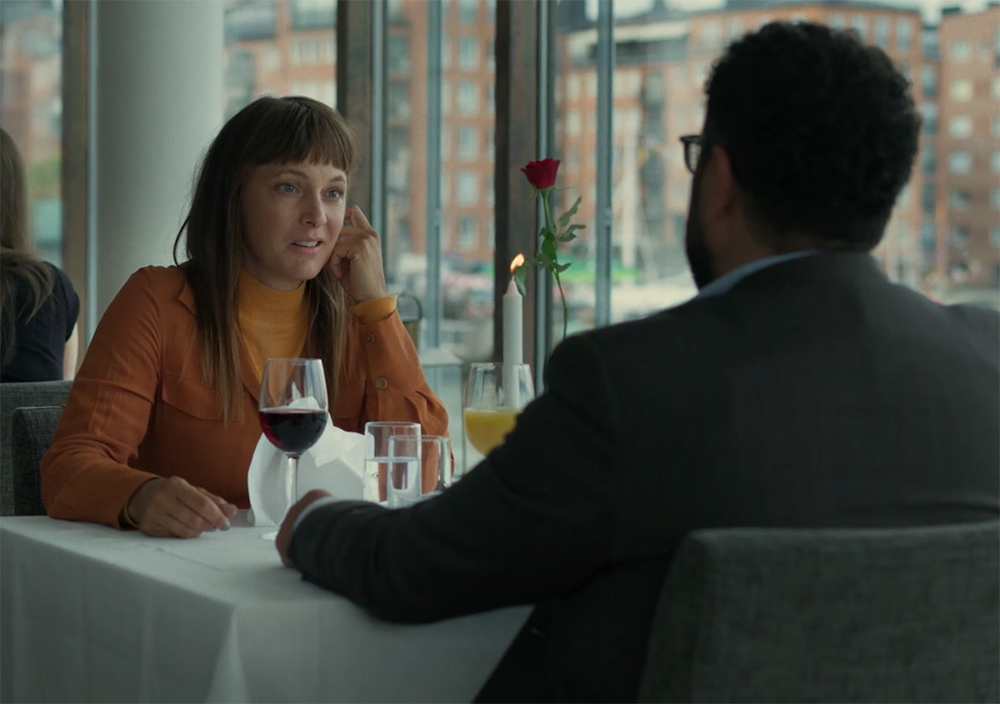
Ariel: That’s a great question. Really it’s the question we want audiences to be asking. Because what Ingrid and Adnan are thinking, or feeling, is almost never what they’re saying. This is partly why the writing process was such a slog. Every line they speak has a subtext. Their whole exchange is a series of attempts to hide or deny or prevaricate about their true feelings—either to themselves or to the other person. Even when they’re arguing a point, or full-on preaching, there’s this subterranean dance they’re engaged in, that motivates their words.
What Ingrid and Adnan both want, ultimately, is to believe that a romantic life with the other person is possible. But “possible” means something different for each of them. For him it can only mean marriage according to Isalmic practice, and ideally her conversion, with all that that entails. For her it means no compromises on any of the Western feminist definitions of equality. And really it means getting him fully, enthusiastically onboard with critical gender theory and the rest of it.
And of course, when you spell it out like that, it seems hopeless. But that’s not their frame of mind. The heart wants what it wants, and each of them is going through these internal contortions, trying on one hand not to alienate that person they’re so attracted to, while on the other hand making no meaningful compromises on their ideological commitments. Which is why they can’t really be honest—with themselves or each other.
Is religion the binding tie of “The Intimate Touch?” Or do you think the movie is trying to talk about differences couples have and whether or not they can bridge those differences?
Michael: Typically films are about conflicts between characters. The best ones though are equally, and sometimes more, about conflicts within characters. I hope “The Intimate Touch” falls in the last category. That was our aim anyway. What really interested us was the internal conflict that both of the characters are faced with. They each have culturally accrued sets of ideas that tell them to act one way, and natural emotions which tell them to act another way.
Also Read: Interview with Tom Heard, Writer/Director Behind the LGBTQ+ Romance ‘Getting It’
For most people basic emotions win in situations like that, at least momentarily, but for people with very strong beliefs, circumstances that pit their ideas against their emotions can be extremely stressful. Religion plays this role for Adnan. It is a belief strong enough to render his natural emotions stressful. For Ingrid, religion is an afterthought. It’s her feminst convictions that really play this role for her.
Can you tell us about the casting process? Was it hard to find the right actor/actress for Adnan and Ingrid?
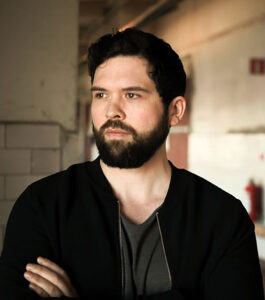
Ariel: Oddly it was harder to cast Ingrid, even though there were far more candidates. Isa was the only candidate we ever seriously considered for Adnan. He read for us via Skype—the “castration of faith” speech—and just owned the part.
We saw a lot of talented candidates for Ingrid, and finally settled on another actor, actually. But she pulled out of the film for medical reasons, which put us back to square one. So we went through all the candidates again, and decided to take another look at Anna, whose audition had been kind of rushed. She was kind enough to come in again and read, and we were really impressed. She turned out to be a great choice. I feel like we got lucky there.
One of my favorite scenes is during Ingrid and Adnan’s dinner. As they are talking about patriarchy and violence, Ingrid seems to purposefully trip an unruly boy running through the restaurant. Was this purposive? And if so, what was your intention in including it?
Ariel: Ha, yeah. Well, can you subconsciously do something on purpose? One of our ideas with the little boy is that Ingrid is projecting onto him some of Adnan’s unacceptable attitudes and behaviors. The build-up to that moment when she trips him actually begins when the boy makes her hold his balloon while he play-fights with Adnan. After he snatches back the balloon and runs off, Ingrid lays out her feelings on toxic masculinity for Adnan, and this starts the whole series of lectures and rejections and humiliations she has to endure, up until Adnan suggests that “maybe she should consider Islam.” Meanwhile, while the waiter stands there waiting with their desserts, and the boy is running around the restaurant with his shoelaces undone, chewing on his balloon.
So her tripping him is mostly a stress response, but certainly there’s a part of her that would like to do to Adnan’s “toxic masculinity” what she in fact does to the little boy.
I thought the film did a wonderful job explaining privilege, and how generalizations and prejudice on both sides can hinder relationships and empathy. What do you think the overarching message of “The Intimate Touch” is?
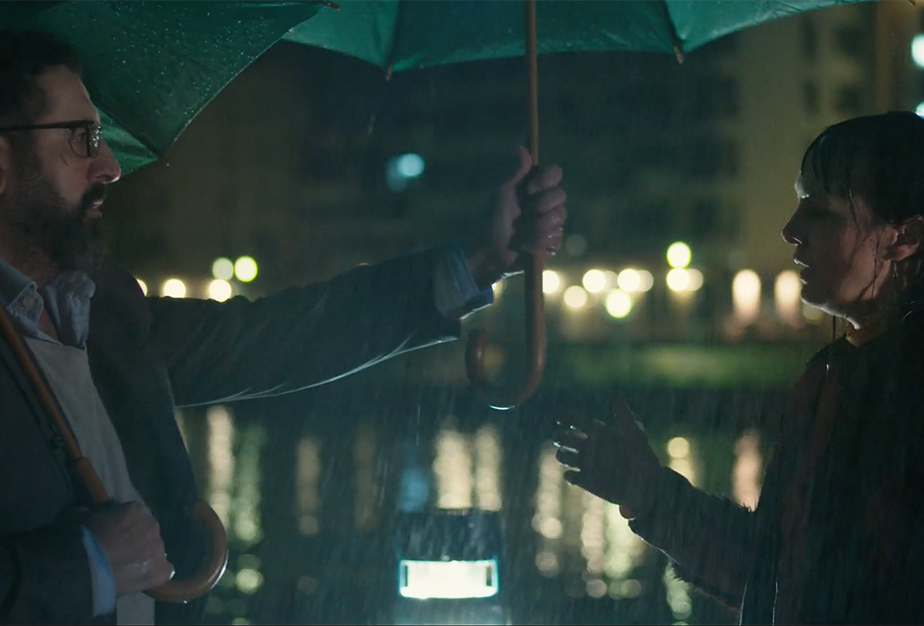
Michael: Well, as I mentioned earlier, we’re not much for messages in movies so I can only really answer that by explaining a little more about what we were interested in exploring rather than what we were trying to say.
We never thought about it in terms of privilege to be honest; but yes, generalizations getting in the way of relationships and empathy were definitely central. Ideologies often reduce others to easily defined good guys and bad guys (just like bad movies do) and get in the way of real understanding and empathy. A situation where people with incompatible world-views are compelled, by the power of attraction, to interact on a deeper level creates an interesting avenue to explore questions about those kinds of simplifications. It allows you to focus on the internal conflicts too…how convictions and emotions can go head-to-head within us.
But with both the external and internal conflicts we really just tried to explore questions we ourselves had rather than create answers. I guess some people feel robbed without a closed conclusion and message at the end of a film, but that’s the way I like them. Films like that feel sensitive to the complexities of reality and also keep the story alive in your mind for much longer. I read an interview with Asghar Farhadi where he said that, “if you give an answer to your viewer, your film will simply finish in the movie theatre. But when you pose questions, your film actually begins after people watch it. In fact, your film will continue inside the viewer.” That’s a message I can get behind.
Did you have any struggles making this film? If so, can you elaborate?
Ariel: Struggles. Of course. One of the first struggles was finding a springboard into the characters. Ideology turns out to be pretty lousy for that. You might think it tells you a lot about a person to say they’re an Islamist, or a radical feminist, but it really doesn’t. The breakthrough, there, came when we realized that if these people were really attracted to each other, they’d be trying to avoid talking ideology. Or at least appear to be trying to avoid it. Suddenly things got more interesting. You started to see characters emerge.
Another struggle was the boiling away all the fat and getting down to the essential story. It’s astonishing how much stuff you think is essential while you’re writing that turns out not to be. We probably wrote four times the amount of dialogue and business that actually appears in the film.
We struggled with financing too, we struggled with scheduling, we struggled with getting the location, then editing, music—the only thing that went pretty smoothly was the actual shoot. It pays to do a lot of planning, and then to be surrounded with dedicated, talented, enthusiastic people.
What are your hopes for “The Intimate Touch” in the future?
Michael: We just recently won the ‘Audience Choice’ award at the Manchester Lift-Off Festival where the film had its premiere, which we’re very happy about but which also shows that there’s an audience out there for the film. We just hope it gets around and people see it and enjoy it and that it sparks interesting questions in their minds. That’s really it. It might even get people into some difficult discussions which would be gravy.
I heard from an acquaintance who had seen the film with some members of his family the other day. He told me that it had sparked a long overdue conversation between them, hopefully a constructive one. Then on a more practical level, you just hope it’s received well so it can help facilitate the funding of your next film.
Do either of you have any projects upcoming in the future? Can you tell us about them?
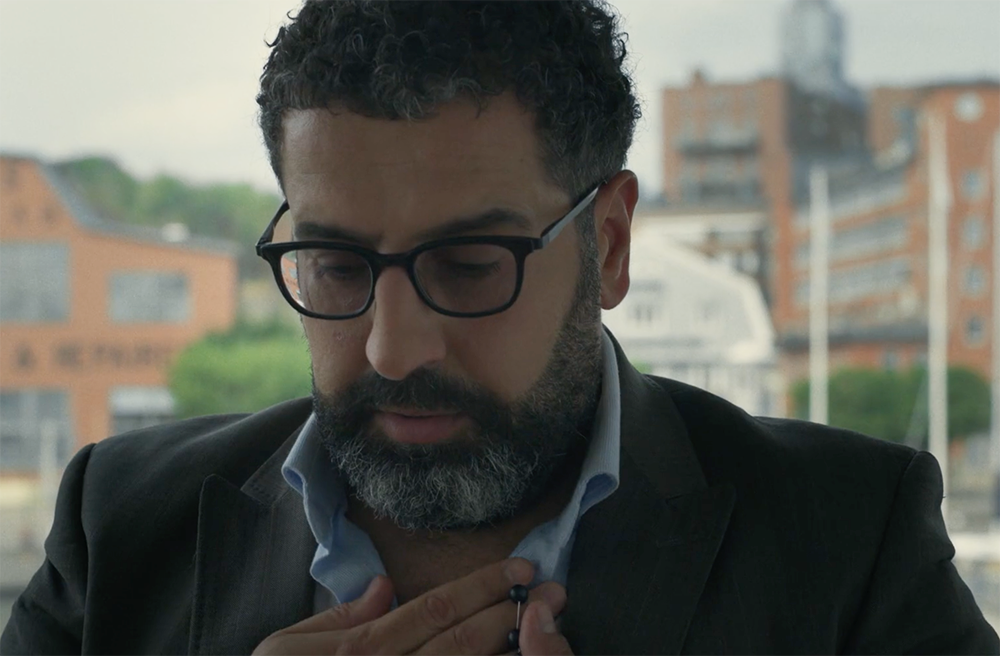
Michael: I’m currently developing a short film I wrote during the post-production of this one. It’s about a loving young father, a struggling musician, who earns his paychecks through hard manual labour. Every time he takes a bath to unwind after a long day, and submerges under the cloudy water, he reemerges as a stern old man. His wife, an ambitious junior architect who suffers from OCD, and their five-year old son, who has an unhealthy fixation with his toy frog, do their best to deal with the unstable and anxious situation his transitions are causing in their lives.
It’s a kind of kitchen-sink magical realism which explores suppressed feelings of inadequacy that express themselves through the need to control. It’s a very mood-based and visual project with minimal dialogue, a direction I want to move in generally. I’m also working on a feature-length screenplay with a similar tone which will hopefully be the project after that.
Ariel: I’m working on a story set in the early ‘90s about a group of teenagers who escape from a cult, and what happens to them after they leave.
Most of the fiction out there on cults I find to be pretty shallow. Invariably the focus is on sensational aspects, at the expense of any real insight into the psychology. I also think it’s a mistake to depict the cult as something external, that ordinary people are immune to: “look at these weird cult members, that you’re at no risk of resembling!”
Documentaries do this too, although recently “Wild Wild Country,” on Netflix, was a rare exception. The best films and books on the subject actually tend not to be set in a cult. “Never Let Me Go,” by Kazuo Ishiguro, and the film based on it, are good examples. “Lord of the Flies,” “The Beach,” “1984”—all great books, and pretty good films, about the cult experience.
Anyway, if I can get it made, it’ll be a psychological drama, with some action and suspense, and a very specific mood of sadness for wasted lives and lost time, and the uncertainty of human connection.
Do you have any advice for filmmakers looking to make their first indie film?
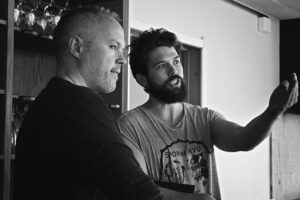
Michael: I’d probably try to talk them out of it. I often think of Adam Sandler’s line in Noah Baumbach’s “The Meyerowitz Stories” when his character explains to his brother why he gave up pursuing music: “It was like walking barefoot through broken glass to get a milkshake. I loved the milkshake, but, you know, my feet were bleeding.”
All jokes aside though, I don’t really feel like I’m in any position to give advice; but if you put a gun to my head I might say something like: there are no shortcuts. Just work hard and don’t compromise and be ready to sacrifice a lot for a little.
Ariel: I’d say don’t wait for anybody’s permission or support. Which is not to say don’t ask for it. Just don’t wait around for it. If you let your work become contingent on someone else’s approval, that’s now who you’re making your film for. Not yourself. Not the audience.
There are some great moments when you feel like you’re doing what you’re supposed to. And if your non-filmmaking days are full of feeling like you’re not doing what you’re supposed to, then those moments can feel like you’ve finally come up for air.
You can watch the trailer for “The Intimate Touch” below. And don’t forget to head over to the film’s official website at www.theintimatetouch.com.

